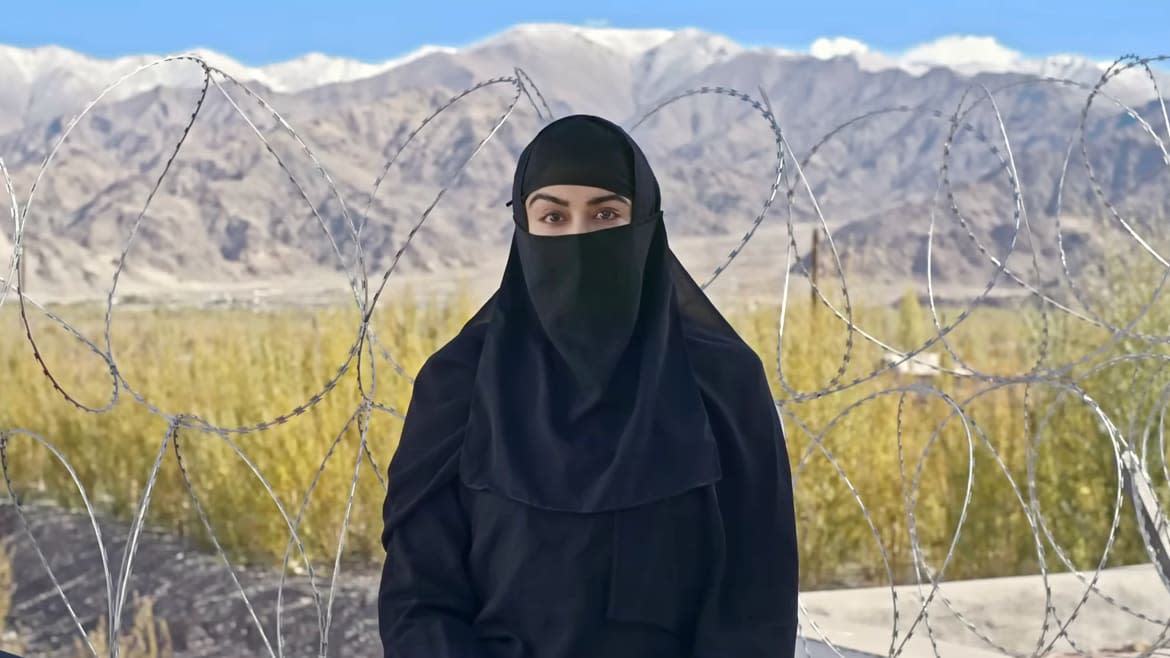Film Inspired by ISIS Wife Forces Mom Into Living Nightmare

When Bindu Sampath played the video attached to a forwarded message she received on WhatsApp last month, her jaw dropped. The video—a teaser trailer for an upcoming movie, Kerala Files, by director Sudipto Sen—showed a burqa-clad woman calling herself Fatima, claiming to be an aspiring nurse from Kerala who was forcefully recruited into the so-called Islamic State (ISIS) insurgency.
The main character, albeit fictional, seemed to be based on Sampath’s own daughter, Nimisha, who also changed her name to Fatima before she left for Afghanistan to join the IS-Khorasan Province (ISKP), the Islamic State’s regional militant group.
In 2015, Nimisha, who was studying to be a dentist, converted to Islam, changed her name to Fatima, and married another convert—Bestin Vincent. Vincent took the name Isa, and had been radicalized by fundamentalist groups in Kerala, according to family members. A year later, Fatima and Isa, along with 19 other youths from Kerala left for Afghanistan to join ISIS.
Several of the Indian foreign fighters in Afghanistan had either been captured or killed in operations by former U.S.-backed Afghan forces. Nearly 1,400 foreign fighters, including several women, were reported to be in Afghan jails at the start of 2020. Among them were Nimisha and the daughter she had with Vincent.
While the movie claimed to follow the “true stories” of women like Nimisha from India, the trailer has already generated a lot of controversy and legal action for spreading misinformation. The trailer states that nearly 32,000 women and girls from the Indian state of Kerala—governed by the Left Democratic Front, rival to the center Bhartiya Janata Party (BJP)—were forcefully converted and radicalized to join the militant group.
Daughter of American ISIS Trainer Details Harrowing Abuse
The claims made in the movie have not only raised questions, but have also been used by Indian right-wing groups to fan flames of hate towards Muslim communities in the country. In an already polarised environment, the video added to the anti-Muslim propaganda under the label of “Love Jihad”—a straw-man term coined to demonize interfaith marriages, particularly involving Muslim men, in India.
The actual figures, however, are drastically lower.
A former security official involved in capturing and investigating foreign fighters under Afghanistan’s previous government told The Daily Beast that “a total of 26 Indians were captured and held in Kabul prisons at the time of the fall of the Afghan government [last year].” Of these, only five were women, he said under the condition of anonymity.
The U.S. Country Report on Terrorism, released last year, also revealed similar findings, stating that “there were 66 known Indian-origin fighters affiliated with ISIS.” The National Investigation Agency—India’s top investigative body—has examined a total of 34 terrorism-related cases linked to ISIS and arrested 160 people, including 10 alleged Al Qaeda operatives from Kerala and West Bengal, according to the U.S. report.
The low numbers may be one the reasons the Indian government hasn’t made more effort to bring those women back, even with repeated pressure from international allies like the U.S.
The former official said that the Indian government has denied several attempts by Afghan security officials to extradite Indian nationals working with ISKP captured in Afghanistan.

A still from the Kerala Files trailer.
“In 2019, we had nearly 1400 foreign fighters from central and south Asian countries, as well as many EU nationals, in Afghan prisons. We contacted their governments [to hand them over], but the Indian officials refused [to extradite their citizens],” he told The Daily Beast. “They interviewed them in Afghan prisons but they did not seem interested in wanting to take them back.”
They were India’s Shamima Begums, he said, comparing them to the British teenager who joined ISIS and was later stripped of her citizenship.
Kabir Taneja, a fellow at Observer Research Foundation, told The Daily Beast that because the number of Indian ISIS fighters is so low, the government has not felt an “overarching obligation to go out of the way and bring back people of a banned terrorist organisation.”
Taneja, author of The ISIS Phenomenon: South Asia and Beyond, said that given the challenges of investigating in places like Afghanistan there aren’t many precedents in successfully trying accused ISIS recruits in a court of law.
“There are many loopholes in the legal system… the chances of the concerned person being set free based on lack of evidence, specifically when it comes to proving that they did fight, commit murder, killed people etc. in a foreign, lawless land,” is high, he said.
“For example, again the Kalyan case, which ran for eight years, ultimately ran out of court time as security agencies were unable to furnish the required evidence, which in reality, would only be possible if they had on ground access in parts of Syria,” he explained, referring to Areeb Majeed, a self-confessed ISIS recruit from Mumbai. Majeed is the only case of a returning ISIS member who was tried in an Indian court, and he was released on bail by the Bombay High Court last year.
Taneja argues that India’s reluctance to extradite Indian national affiliated with terror groups may have more to do with with public opinion, than actual policies. “In fact, the public view is largely contrary to repatriation,” he said.
“The public would be hard-pressed to find a returnee’s policy appealing, let alone the legitimation of people who had joined a group such as ISIS in countries like Syria or Afghanistan,” he wrote in a study, adding that implementing policy around foreign fighters could also come with a political price for the incumbent government.
Sampath echoed similar views from her own experience. She knocked on many doors after learning of her daughter’s detention in a Kabul prison, to little avail. Along with other parents of Indian recruits, she made several pleas to the Indian government and courts requesting the extradition of the Indian nationals, including children. “My granddaughter [born to Fatima in Afghanistan] is innocent in all this and in an extremely vulnerable environment,” she said.
She said she receives frequent threats and abuses for her vocal stance on the extradition of her daughter. Movies like Kerala Files “don’t offer any solution, but instead they want to provoke the religious sentiments of the masses,” Sampath said, referring to increasing Islamophobia in India. “If they really cared about this issue, they would be pressuring the government to investigate the radicalisation and recruitment among Indian youth.”
Since the release of the trailer, Sampath, who had refused to be part of Sen’s film, has received an overwhelming barrage of online threats and messages from rightwing extremists. “They want to constantly rewind our grief, tear us down and harass us,” she said.
The movie's director turned down requests for comments from The Daily Beast.
The harder Sampath tries to campaign for the return of her daughter and granddaughter, the stronger the push in the media is against her. “When I speak in the media, I get called the mother of ISIS, sometimes by the journalists themselves. They say awful things to me and about my family, not realizing the pain I have suffered as a mother.”
Bringing Indian citizens home, Sampath says, could also be an opportunity for the government to investigate the recruitments. “If they want they can bring these youths back and use their information to crackdown on networks that pushed the children onto this path,” she said.
But to do so, Taneja says, legal avenues and inter-agency cooperation need to be strengthened, both internationally and domestically. “Cooperation on this issue is key, and should be raised at forums like G20 and SCO to create strong extradition ecosystems with partner states,” he said.
India is not the only country resisting repatriation of nationals associated with ISIS. Speaking at an anti-ISIS global coalition last year, U.S. Secretary of State Antony Blinken said that over 2,000 ISIS fighters in detention camps across Syria are foreigners. He urged countries to repatriate their citizens and “to prosecute where appropriate, to rehabilitate and reintegrate where appropriate.”
But it maybe a little too late for the Indian women captured in Afghanistan
A massive jailbreak orchestrated by the Taliban when they captured the Afghan capital in August 2021 ended with all convicted criminals freed. But the current status and location of Indian fighters is not known, and security analysts watching Afghanistan speculate that several ISKP-linked foreign nationals—including Indians—may currently be using Afghan territories to mobilize.
ISKP attacks have been rising since the Taliban takeover, including 17 attacks largely against the Hazara ethnic group and religious minorities, resulting in over 700 casualties.
“Indian agencies were slow in the beginning to understand what the real threat of ISIS is. India took a long time to catch up with this, and in some way, is still playing catch-up,” Taneja said, adding that while agencies are more equipped to handle traditional terror threats, ISIS is increasingly focused on spreading its ideology into households via the internet. “A declared terror entity in a place like Kashmir is comparatively easy to find and target, ISIS-led radicalization was a different beast altogether.”
Get the Daily Beast's biggest scoops and scandals delivered right to your inbox. Sign up now.
Stay informed and gain unlimited access to the Daily Beast's unmatched reporting. Subscribe now.

